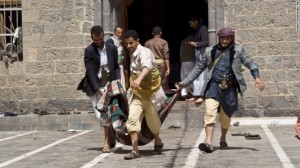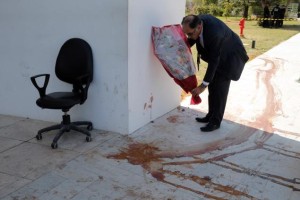By Kyle Herda
Impunity Watch Reporter, Europe
KIEV, Ukraine – While pro-Russian rebels in Eastern Ukraine may have initially been happy when they gained control of some land, they are now facing the struggles that come with disassociating from the parent nation. Economic times are tough in rebel-held territory, and those living in Eastern Ukraine are struggling.

After losing sections of Eastern Ukraine to pro-Russian rebels, Kiev installed some cuts to the banking system and also imposed some travel restrictions. In effect, these moves have caused those already in East Ukraine to become trapped without much aid or assistance from outside, increasing the poverty issue for those in pro-Russian land. The Ukrainian military is claimed to be denying aid to the East, and the pro-Russian rebel’s People’s Republic of Donetsk has handled the need for aid by denying there is a need for it. Either way, both sides are denying aid to those in need.
Some kids living in Eastern Ukraine are also being denied school by their parents due to concerns that it is not safe. Those who remain speak about the damaged homes and loved ones who were killed in the fighting, as well as the many who have already left to move either further West or into Russia. Despite the ceasefire, fighting has yet to completely halt in Eastern Ukraine, as artillery fire reportedly hit rebel-held Donetsk on Sunday. It appears that the shelling originated near the Donetsk airport, and Ukrainian soldiers further report that small arms, 82mm mortar shells, and rocket-propelled grenades were used against government troops near the airport overnight; three people have been injured in the attacks.
Ukrainian soldiers also report small arms fire and 120mm mortar shells were fired upon them in Luhansk and near Mariupol, and further that there were nine incidents where pro-Russian rebel drones were seen in the air. NATO’s joint intelligence unit in the United Kingdom, according to U.S. Air Force General Philip Breedlove, has also confirmed that Russia continues to send military and economic support into Eastern Ukraine for the pro-Russian rebels.
Perhaps pressured by all of this, neighboring NATO countries, particularly in the Baltics, have been very concerned over the past year that they may be next in sight for Russia. In an effort to increase pressure on Moscow and ease concerns of military takeover in other Eastern European nations, the United States is currently engages in “Operation Dragoon Ride,” which involves a parade of Strykers and the US Army’s 2nd Cavalry Regiment riding throughout Eastern Europe.
For more information, please see:
Sky News (AU) – Artillery rocks Ukraine rebel base Donetsk – 23 March 2015
USA Today – For pro-separatist Ukrainians, hardship replaces hope – 22 March 2015
Bloomberg View – NATO Says Russia’s Still Pouring Arms Into Ukraine – 22 March 2015
RT – US military convoy parades through Eastern Europe – 22 March 2015


